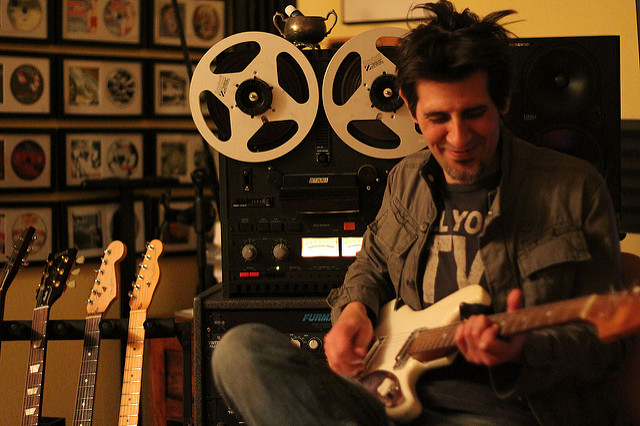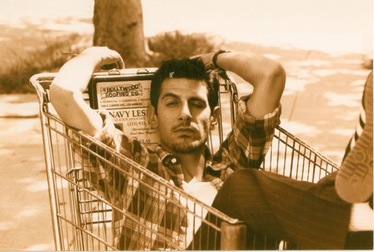|
Magnetic West: Can you give an example of how music or sound has triggered an emotion in your life? Levick: For me, sound and emotion is more of a music thing, and as you get older you know you get a little more detached from your emotions or I guess you learn to control them and not be slave to them - they go too far…but, I would say that music used to be a very emotional experience for me. I used to be able to put on Angie by the Stones or Bowie’s Diamond Dogs, and that would take me through a whole palette of emotions. I would say, now the closest I come is, every now and then you get that perfect mix and you’ve listened to it in your car and then your boom box, then the other car, and it sounds great everywhere and that makes me feel really good. Sometimes live music will do it, like a good show. Sometimes your having one of those great shows, you’re not thinking too much and just cruising along…people are hanging on every word, you’re connecting… Magnetic West: what about the same idea in convergence with media? Is there a convergence that stands out? Levick: like, Say Anything, with the Peter Gabriel song? I always wonder how much they manipulate you with the music in these shows, like what would happen if they stripped all the music, would you still feel what they want you to feel just from the acting? It’s hard to know because they don’t ever do that, Magnetic West: well, what would be your guess on that? Levick: my guess is they’re totally manipulating you, and there’s nothing wrong with it, I mean, I’m sure people do movies without music and if they’re able to move you without the aid of music, then more power to them. It’s interesting because I’ve been licensing since 2004 and it took 10 years to learn what they’re really looking for is a mood. What they want is a song that is categorically one mood, you know, they don’t want anything ambivalent. That’s what I’ve been trying to keep in mind when I write for these shows. So, you can have the coolest track in the world and it wouldn’t work for TV, you’d almost have to dumb it down to this is sad . Magnetic West: yea, pinpoint the mood Levick: pinpoint the mood Magnetic West: any specific songs, like you mentioned the Peter Gabriel tune in Say Anything? Levick: yea, In Your Eyes in that movie….well, the best thing is, lately, since Bowie died ( I’m a huge Bowie fan ) they’ve been using him a lot, and there’s something about hearing a song that you grew up with in a movie that makes it ten times more powerful…I don’t think it makes you like the song more, it makes you like the movie more… Magnetic West: I know you’ve licensed your music to shows like Shameless, which is one of my favorite shows, is there any of your tracks that standout in their convergence with media ? Levick: There’s one song they put on Sons of Anarchy that I’m really proud of.,. I got a call for something completely different, they wanted a back porch blues thing, just guitar and vocal, so I called Jeff Pevar and said “ just play one guitar or two and send it to me ” and the whole thing went down in an hour, and I got it and threw a vocal on it, and I remember thinking, this would be really cool on Sons of Anarchy and a month later it was on Sons of Anarchy…it didn’t get on the show we did it for but you know I don’t deal directly with a lot of the shows so I never know, a lot of times I find out later what it was on, like way later, like six months later. Magnetic West: like on statement? Levick: yea, but I’ve started thinking more about what shows I’m writing for…like Shameless, they ask for my stuff, and I don’t have a whole lot of time to write songs that I’m not really commissioned to write but sometimes I’ll sit down and go, let’s write something that I can send to that show. Magnetic West: so around 2004 you started focusing on writing for film / tv , how that get started? Levick: It was a really weird convergence, I had kind of a late start, I mean , I’ve always been playing music, but I spent my teenage years and part of my twenties just partying so I feel like I’m ten years behind everyone else in terms of where my life should be and my career… Magnetic West: I’ve always felt like that too, in my twenties I lived in Hawaii… Levick: you can’t get anything done in Hawaii. Magnetic West: just hanging on the beach … Levick: but back then you’re not thinking that it was a waste of time, just, this is great! So, I started getting into serious bands in my mid - twenties, and what happened was, my last band ended in 2001 and I was thinking this is the last time I’m doing this music industry thing. I had just had a kid in ’98 and we were still doing these tours, SXSW and coastal tours, but it was getting harder and harder to be gone. What actually happened was, our first album was put out by this indie label called Pinch Hit that got us on commercial radio, and it charted in some places, it wasn’t great, it never turned into money , but it was nice, and they gave me an advance for the solo album after the band broke up. Instead of going to a studio I decided to buy a Mac and a pre-amp and a mic and basically I spent a year on two songs, just learning how do it, just tweaking and tweaking those two songs. When I was done with that, I just happened to be in the right place at the right time and had friend who worked for this company that asked me to do a couple songs and I was able to bang them out, and I had a partner that I was writing with from the band I was in, we did it together and they liked it, so we just started doing CDs for all these music libraries. When my daughter was going into first grade, we wanted to leave LA because we didn’t like the school systems and my wife had some family in Southern Oregon. So, we moved to Grants Pass and there was nothing to do there. I didn’t know anybody and we lived there for 3 years and in those 3 years I got my catalogue from 20 songs to like 200 songs because all I did was write.
0 Comments
The producers of an independent film want to create a team that will compliment their vision and help them reach their goals. Hiring an experienced music supervisor can greatly assist in the creative, financial and legal development of the project's musical concept. With the aid of a music supervisor the producers can be assured that the rights to use the music are properly cleared and licensed for use. Having a creative music supervisor working with the director on music through research, selection of songs and coordinating with the composer for a unique original score, creates a cohesive project which ultimately produces a higher level of success in both marketing and distribution. Just as independent filmmakers are aware of the benefits of hiring a composer to create original music for their projects as an alternative to purchasing stock music, the important role of a music supervisor follows this pattern to increase the quality of the production. Hiring a music supervisor at the beginning of a production allows time to discuss, from a creative, legal, financial and technical standpoint, the potential options for music. For instance, working on an independently funded documentary with little or no music budget, an experienced music supervisor would help develop the musical vision with the realities of what the cost may be, including the research of potential songs and recordings under consideration for licensing by the filmmaker and a discussion of composer production costs. The music supervisor can offer viable options and craft a sensible financial plan. A music supervisor will be able to get a filmmaker grounded in what is realistic from the beginning of their production and provide realistic strategies to obtain the rights for the music that is desired and provide viable alternatives. A music supervisor can also work with the composer to help articulate the type of score that most fits the collective vision and budget of a project while overseeing the score's production and on-time delivery for editing the audio mix. The music supervisor can coordinate and produce live music performances or scripted music scenes, including the hiring of musicians and other performers. Also, they can coordinate and produce specifically written songs and tracks for the production. A music supervisor with expertise in music clearance can design the most cost-effective licensing strategy, saving production time and money in licensing fees. They will have developed relationships with the personnel of the independent music publishing departments. Select music supervisors that are part of a full service music companies like Magnetic West Music are additionally publishing their own catalogue of music for easy one-stop access to fresh tracks from indie bands and composers. Companies like this will often have their own composers, the ability to edit and provide variations of the music, plus they have more flexibility in licensing costs.
One of the key moments of the music process for any production is the spotting session, where the director, producers and editors, along with the music supervisor and composer, review the film scene by scene and come up with a overview for the composer and music supervisor to follow in the creation of the score and placement of licensed tracks. The supervisor helps the director and composer providing recommendations and solutions. The supervisor ensures that the director's vision is communicated to the composer in terms of type of musical style the composer will use. The music supervisor can create spotting notes listing each potential cue or licensed song, its' start and ending times and notes about the moment itself, such as certain accents or mood changes. The entire team then has the same time-coded outline to work from, right through to the final audio mix. A supervisor can produce a video file embedded with potential songs against picture and placing cues as they are delivered by the composer delivering an overview for the producers and director to review. Once the film has completed its final audio mix, the music supervisor will issue appropriate synch and master use licenses for all songs and tracks, based upon the terms, fees and conditions previously granted in writing. A music supervisor can properly prepare the end music credits for the film dictated by each music license and composer requirements. Before commercial exhibition of the film, a music supervisor will deliver the cue sheet that the distributors will request, and the music licensors will require containing a complete listing of all song and score cues, timings, authors and publishers and performance rights affiliations. As independent filmmaking continues to reach a wider audience, the responsibility filmmakers have towards the music in their projects increases. The more a filmmaker utilizes the services that a music supervisor can provide, the easier music can be incorporated properly and the stronger the impact of the music will be in their projects. |
AuthorMike Caruso Archives
February 2024
|
|
© COPYRIGHT 2023 MAGNETIC WEST MUSIC |



 RSS Feed
RSS Feed
